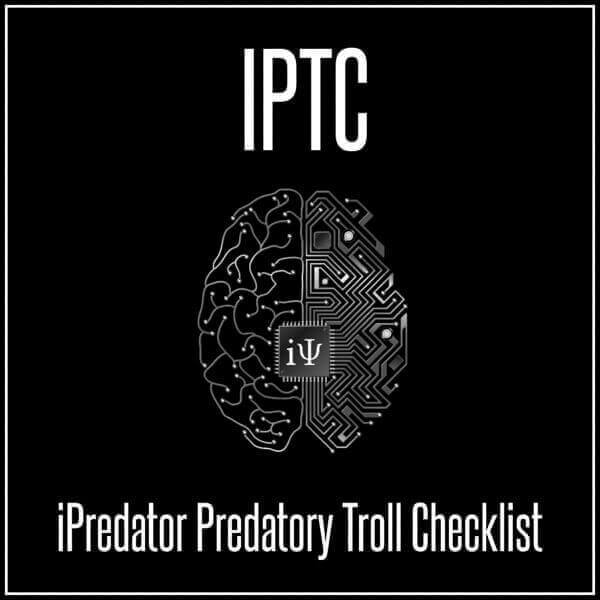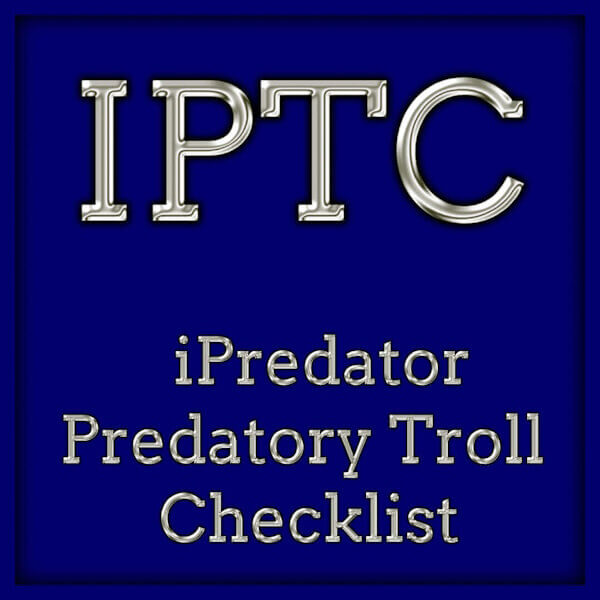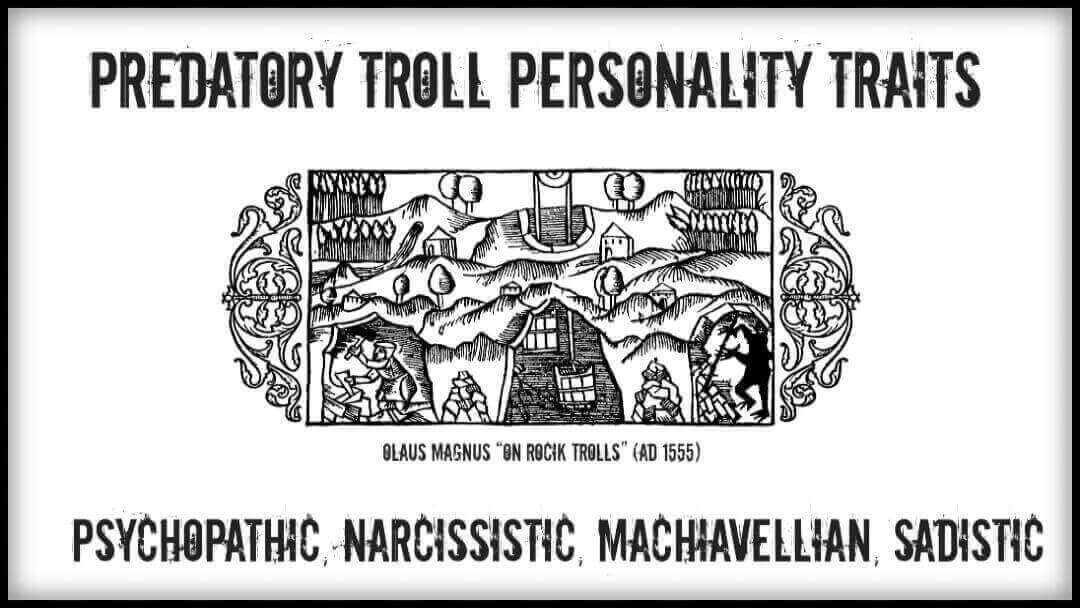iPredator Predatory Troll Checklist
(IPTC)
The iPredator Predatory Troll Checklist (IPTC) is a 100-item data collection, diagnostic and educational tool designed to assess if a predatory troll is targeting an online user. The IPTC investigates the vulnerability of being cyber-attacked by an iPredator. Areas examined in the IPTC include online reputation risk, cyber security and predatory troll identification preparedness. The IPTC combines aspects of cyberstalking, cyber harassment and internet trolling.
The IPTC can also be used as a data collection instrument to present to authorities if an online user is actively being trolled, cyberstalked or harassed. The IPTC has been designed with the knowledge that predatory trolling is both a method used by assailants and a typology of offender who engages in the behavior of trolling. The IPTC addresses the differences between a classic internet troll and a predatory troll.
IPTC Directions
- The time needed to complete the IPTC checklists averages 30-45 minutes.
- To complete the checklist, you must respond to each statement with 1 of 4 choices as follows:
Y__ (Yes, Agree, True)
N__ (No, Disagree, False)
IDK__ (I Do Not Know, I Did Not Know, I Am Unsure)
DNA__ (Does Not Apply, Not Applicable, Not Relevant)
- Only answer “Yes” or “No” to statements you are positive about or almost certain.
- If there is a question you do not understand, respond with choice D. DNA__ (Does Not Apply, Not Applicable, Not Relevant)
- If there is a question that does not apply to you being queried, respond with choice D. DNA__ (Does Not Apply, Not Applicable, Not Relevant). For example, if a checklist statement addresses your job, but you are not employed, you would respond with choice DNA__.
- Please provide a response to each question with one of the four responses before calculating your final score. All questions have been designed to make scoring easy to compile. Simply add up your correct responses (+1) and compare your score to the scoring key included in this file.
- Prior to taking the checklist, please review the following three definitions and refer to them if needed. The definitions of Internet Trolls, Predatory Trolls and iPredator are as follows:
Internet Trolls
Internet Trolls: An internet troll is an online user who uses Information and Communications Technology (ICT) to provoke, defame, anger, tease or incite other online users. Often, the internet troll does not know the target recipient(s) of their vitriolic statements and behaviors. Internet trolls regularly appear in all forms of online mediums ranging from online gaming to chatrooms and forum discussions.
When the internet troll’s inflammatory statements and actions do not include a direct or implied physical threat to the target(s), their behavior is categorized as cyber harassment. If the troll’s verbal assaults include direct or implied physical threats to their target(s), their actions are then defined as cyberstalking. The motivations for an internet troll’s provocative, and often, bizarre behaviors are many. Despite the variations, most trolls seek attention, recognition, stimulation pseudo-notoriety or retribution for some unknown perceived injustice.
Predatory Trolls
Predatory Trolls: Predatory trolls are a breed of internet troll that evolved from the classic troll. They are online users who both choose online users randomly and intentionally. Just like classic trolls, predatory trolls can be ex-work associates, ex-partners and loved ones. They may also be unknown online users. Predatory trolls may target others alone, but increasingly work in groups (aka, Troll Triad). Like all trolls, predatory trolls are driven by needs for power, recognition, peer acceptance and control.
Different from classic trolls is that their primary goal is to destroy an online user’s reputation, online presence and trustworthiness. With the advancement of Information and Communications Technology (ICT), predatory trolls may be employed by groups and governments in covert operations to destroy a target’s reputation and livelihood.
Predatory trolls seek to destroy their target’s reputation and the reputation of their family members, children, careers and loved ones. They always engage in defamation, slander, libel, disinformation campaigns and criminal defamation. All predatory trolls meet criteria for either iPredator or iPredator Bridge and are skilled in Cyberstealth. Depending on the intensity of attacks, some targets become traumatized and may suffer psychological dysfunction. As the Information Age advances, predatory trolls will become increasingly problematic to all aspects of society.

iPredator
iPredator: A child, adult, group or nation who, directly or indirectly, engages in exploitation, victimization, stalking, theft or disparagement of others using Information and Communications Technology (ICT.) iPredators are driven by deviant fantasies, desires for power and control, retribution, religious fanaticism, political reprisal, psychiatric illness, perceptual distortions, peer acceptance or personal and financial gain. iPredators can be any age, either gender and not bound by economic status, race or national heritage.
iPredator is a global term used to distinguish anyone who engages in criminal, deviant or abusive behaviors using Information and Communications Technology (ICT.) Whether the offender is a cyberbully, cyberstalker, cyber harasser, cybercriminal, online sexual predator, internet troll, online child pornography consumer or cyber terrorist, they fall within the scope of iPredator. The three criteria used to define an iPredator include:
- A self-awareness of causing harm to others, directly or indirectly, using ICT.
- The intermittent to frequent usage of Information and Communications Technology (ICT) to obtain, exchange and deliver harmful information.
- A general understanding of Cyberstealth used to engage in criminal or deviant activities or to profile, identify, locate, stalk and engage a target.
Unlike human predators prior to the Information Age, iPredators rely on the multitude of benefits offered by Information and Communications Technology (ICT.) These assistances include exchange of information over long distances, rapidity of information exchanged and the infinite access to data available. Malevolent in intent, iPredators rely on their ability to deceive others using Information and Communications Technology (ICT) in an abstract electronic universe.
Note: In the IPTC, the online user represents the potential predatory troll.
- Subjects Gender: Male__ Female__
- Age: Tween (12-17) __Teen (18-20) __Young Adult (21-25) __Adult (26+) __Business__
- Average Daily Online Activity: 0-1 Hour__1-3 Hours__3-5 Hours__5+ Hours__
A. Y__ (Yes, Agree, True)
B. N__ (No, Disagree, False)
C. IDK__ (I Do Not Know, I Did Not Know, I Am Unsure)
D. DNA__ (Does Not Apply, Not Applicable, Not Relevant)
- Every time you log in, you monitor the online user’s social accounts.
- Colleagues or loved ones have spoken to you about the online user.
- It seems as if the online user follows everything you post online.
- Others are afraid to collaborate with you fearing they will be cyber-attacked.
- The online user accused you of being homophobic or racially prejudiced.
- The online user accused you of threatening them.
- The online user announced they were filing charges against you.
- The online user believes the ends justify the means.
- The online user blames others for their actions.
- The online user accuses you of targeting their loved ones or associates.
- The online user defines him or herself as a victim.
- The online user defines him or herself as an expert.
- The online user defines him or herself as being an activist or whistleblower.
- The online user enjoys the harm they cause you or others.
- The online user feels it is their duty to cyber-attack you.
- The online user feels justified in their cyber-attacks.
- The online user habitually presents him or herself as successful.
- The online user habitually presents him or herself in the best possible light.
- The online user habitually takes your online content out of context.
- The online user has accused you of being a criminal.
- The online user has accused you of being a cyberstalker.
- The online user has accused you of being a liar.
- The online user has accused you of being a sexual deviant
- The online user has accused you of being abusive.
- The online user has accused you of being mentally ill.
- The online user has attempted contacting a loved one.
- The online user has attempted contacting your customers or work associates.
- The online user has accused you of doing the same things they have done to you.
- The online user has attempted contacting your social account friends or followers.
- The online user has attempted extorting you.
- The online user has attempted impersonating you online.
- The online user has attempted provoking you into online arguments (aka, flaming).
- The online user has authored defamatory blog posts about you.
- The online user has contacted you from an unknown email address.
- The online user has contacted you more than three times.
- The online user has contacted your adversary or ex-intimate partner.
- The online user has contacted your boss or supervisor.
- The online user has contacted your parents or children.
- The online user has created injurious blog posts or a website about you.
- The online user has created video clips defaming you.
- The online user has harassed you and an online associate repeatedly.
- The online user has cyber-attacked you for at least three months.
- The online user has intimidated others from contacting or being involved with you.
- The online user has emailed you more than two times with a threatening message.
- The online user’s social profile has been suspended or deleted.
- The online user has infiltrated your online gaming.
- The online user has intentionally posted false information about you.
- The online user has launched a website about you.
- The online user has lied to other online users.
- The online user has made aggressive or violent threats.
A. Y__ (Yes, Agree, True)
B. N__ (No, Disagree, False)
C. IDK__ (I Do Not Know, I Did Not Know, I Am Unsure)
D. DNA__ (Does Not Apply, Not Applicable, Not Relevant)
- The online user has made outrageous allegations about you.
- The online user has manipulated or encouraged others to cyber-attack you.
- The online user has multiple profiles in social media platforms.
- The online user accuses you of having ulterior motives.
- The online user has published content suggesting you are sexually promiscuous.
- The online user has published defamatory information about you.
- The online user has published negative content about you from your past.
- The online user has posted private or identifying information about you.
- The online user has published sensitive or confidential information about you.
- The online user has repeatedly text messaged you.
- The online user has reported your account(s) to social media platforms.
- The online user has slandered you using audio and/or visual media.
- The online user has targeted other online users.
- The online user has targeted you in virtual world environments.
- The online user has taunted you or other online users.
- The online user has threatened legal action against you or your job.
- The online user has threatened your work associates or online associates.
- The online user has used media other than social media to defame you.
- The online user holds a grudge.
- The online user is always online.
- The online user is obsessed with you.
- The online user is self-centered and narcissistic.
- The online user is trying to destroy your reputation.
- The online user knows personal things about you.
- The online user manipulates other online users.
- The online user posts content soon after you post content.
- The online user publicly justifies their cyber-attacks.
- The online user quickly creates a new profile after theirs has been suspended.
- The online user refuses to take responsibility for their actions.
- The online user regularly engages in online deception.
- The online user is following your every move.
- The online user tracks your social media accounts.
- The online user uses the internet to hurt you and others.
- The online user views himself as the hero.
- You and others believe the online user is a con artist.
- You believe the online user is grandiose.
- You feel there is no help for dealing with the online user.
- You feel the online user will never stop targeting you.
- You have attempted to or filed a police report involving the online user.
- You have been advised to or have blocked the online user.
- You have been contacted by others who have been cyber-attacked.
- You have contacted a legal professional to discuss the online user.
- You have contacted or reported the online user to law enforcement.
- You have reported the online user to their internet services provider.
- You have blocked the online user from your social accounts.
- You have reported the online user to a social network platform.
- You have researched the term “internet defamation” due to the online user.
- You suspect the online user is a sociopath or psychopath.
- You suspect the online user is internet addicted.
- You suspect or know the online user suffers from a mental illness.
A. Y__ (Yes, Agree, True)
B. N__ (No, Disagree, False)
C. IDK__ (I Do Not Know, I Did Not Know, I Am Unsure)
D. DNA__ (Does Not Apply, Not Applicable, Not Relevant)
Yes Answers___ No Answers___ I Do Not Know___ Does Not Apply___
No Answers___ = IPTC Score
Preferred Answer for Each Checklist Statement (No, Disagree, False)
IPTC Score Definition
IPTC Score: Upon completion of the IPTC, the respondent will have a final score ranging from 0-100. In this formula, the score represents the risk potential and vulnerability of the online user, the business or the subject being queried from being targeted by a predatory troll. Whether taken one time or on multiple occasions, the goal is to finish with a score lower than ten. Based on your score and concern for future cyber-attacks, IDK checklist responses should be investigated.
IPTC Scoring Key
- Score: (90-100)
- Category: Guaranteed Predatory Troll Target and Extremely Vulnerable.
- Risk Potential: Alarmingly High.
- iPredator Involvement: Certain.
- Intervention Plan: Professional Consultation Highly Advised.
- Level of Urgency: Urgent Attention Required.
- Score: (79-89)
- Category: Prime Predatory Troll Target and Extremely Vulnerable.
- Risk Potential: High.
- iPredator Involvement: Almost Certain.
- Intervention Plan: Professional Consultation Highly Advised.
- Level of Urgency: Immediate Attention Required.
- Score: (56-78)
- Category: Probable Predatory Troll Target and Extremely Vulnerable.
- Risk Potential: Moderately High.
- iPredator Involvement: Involvement Likely.
- Intervention Plan: Professional Consultation Highly Advised.
- Level of Urgency: Immediate Attention Strongly Recommended.
- Score: (40-55)
- Category: Likely Predatory Troll Target and Moderate Vulnerability.
- Risk Potential: Moderate.
- iPredator Involvement: Involvement Suspected.
- Intervention Plan: Create and Implement an iPredator Prevention Plan.
- Level of Urgency: Immediate Attention Recommended.
- Score: (30-39)
- Category: Possible Predatory Troll Target and Moderate Vulnerability.
- Risk Potential: Moderate.
- iPredator Involvement: Involvement Possible.
- Intervention Plan: Increase iPredator Protection & Prevention Strategies.
- Level of Urgency: Immediate Attention Suggested.
- Score: (11-29)
- Category: Skilled Predatory Troll Protection and Low Vulnerability.
- Risk Potential: Mild.
- iPredator Involvement: Possible, but Unlikely.
- Intervention Plan: Continue iPredator Protection & Prevention Strategies.
- Level of Urgency: Not Urgent, Important to Address if Score is 30 or more.
- Score: (1-10)
- Category: Advanced Predatory Troll Protection and Minimal Vulnerability.
- Risk Potential: Minimal.
- iPredator Involvement: Unlikely.
- Intervention Plan: Consider Educating Others.
- Level of Urgency: 0%, All iPredator Issues Addressed.
It is recommended to complete the IPTC on a quarterly basis and more often if a predatory troll is suspected of launching a cyber-attack. Although achieving a low score indicates a minimal probability of being targeted, it is still crucial to be alert and prepared to defend against iPredators. Predatory trolls will modify their tactics paralleling advances in technology. Cyberspace represents an artificial abstract electronic universe. The toll cyber-attacks can take on vulnerable and/or ignorant online users is absolutely real and can range from frustrating to deadly.

Michael Nuccitelli, Psy.D.
Michael Nuccitelli, Psy.D. is a NYS licensed psychologist, cyberpsychologist and online safety educator. In 2009, Dr. Nuccitelli finalized his dark side of cyberspace concept called iPredator. Since 2010, he has advised those seeking information about cyberbullying, cyberstalking, cybercriminal minds, internet addiction and his Dark Psychology concept. By day Dr. Nuccitelli is a practicing psychologist, clinical supervisor and owner of MN Psychological Services, PLLC. After work and on the weekends, he volunteers helping online users who have been cyber-attacked. Dr. Nuccitelli’s is always available to interested parties and the media at no cost. The iPredator website and everything created by Dr. Nuccitelli is educational, free and public domain.
Michael Nuccitelli, Psy.D.
New York City, NY
Website: www.ipredator.org
Phone: (347) 871-2416
Email: drnucc@ipredator.org
“All Predatory trolls are iPredators but not all iPredators are Predatory trolls.”



